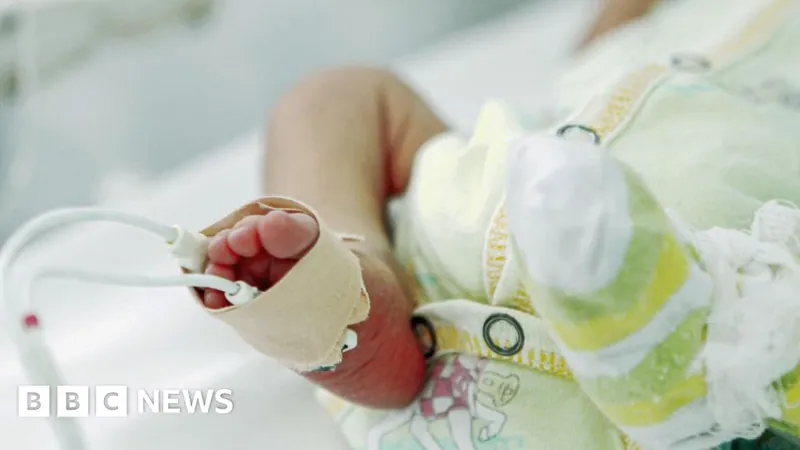
Urgent Call for Action: Coroner Warns of Possible Future Deaths from Contaminated Baby Feed
2024-11-19
Author: Sarah
A senior coroner has issued a dire warning that unless stringent measures are implemented, more innocent lives could be lost due to contaminated baby feed. This alarming statement follows the tragic deaths of three premature infants, all of whom received tainted feed while under hospital care.
In-Depth Case Analysis
The first victim, three-month-old Aviva Otte, tragically died in January 2014 after being administered contaminated total parenteral nutrition (TPN) at St Thomas' Hospital in south London. Just months later, in June, one-month-old Oscar Barker and nine-day-old Yousef Al-Kharboush also succumbed to other incidents involving contaminated feed from a different source.
Coroner's Investigation
In an inquest led by Dr. Julian Morris, the senior coroner for Inner South London, concerns were raised over the lack of legal obligations for St Thomas' Hospital to report the first incident. Consequently, Dr. Morris has called for urgent legislative changes to prevent future occurrences.
Details of the Contaminated Feed
The babies, all born prematurely, were receiving their nutrition intravenously through TPN, a critical method often used for those who cannot eat by mouth. Specifically, Aviva's TPN was prepared by NHS pharmacists at St Thomas', while Oscar and Yousef received feed manufactured by a private company named ITH Pharma, which distributed products to several health trusts.
Identifying the Contaminant
The deadly bacteria Bacillus cereus was identified as the contaminant responsible for these infant deaths. Dr. Morris expressed his deep concern that insufficient regulation of hospital-produced medicines like TPN could pave the way for additional fatalities. Unlike medications produced by commercial manufacturers, bespoke preparations made in hospitals – referred to as “Section 10” settings – are not required to follow the same rigorous regulatory protocols. This loophole allows adverse incidents associated with these medicines to go unreported, leaving other healthcare providers and the industry at large unaware of potential dangers.
Call for Action from Health Authorities
In a pointed letter to Health Secretary Wes Streeting, Dr. Morris emphasized the necessity for actionable reforms to safeguard vulnerable infants. He noted that while the NHS and the Care Quality Commission (CQC) mandates reporting of incidents, the criteria for doing so remain ambiguous and largely dependent on the discretion of individual trusts.
Concerns Regarding Bacillus cereus
Dr. Morris also pointed out the persistent threat posed by Bacillus cereus, which is known to resist several cleaning methods, often necessitating the use of specialized sporicides to ensure thorough decontamination. Alarmingly, it was revealed that St Thomas' Hospital had prior knowledge of the risks related to this bacteria before the devastating outbreak, yet failed to relay this critical information to other institutions.
ITH Pharma's Regulatory Breaches
In a significant development, ITH Pharma was fined £1.2 million in 2022 after it was revealed that 19 premature infants across nine hospitals, including Oscar and Yousef, were infected by contaminated TPN sourced from the company in 2014. The firm admitted to a series of regulatory breaches.
Response from ITH Pharma
In response to the coroner’s recommendations, ITH Pharma expressed its commitment to enhancing information sharing and learning across the industry. A representative stated that timely communication of information related to previous outbreaks could have been instrumental in averting this tragedy.
Changes in Hospital Practices
Moreover, following Aviva's death, Guy’s and St Thomas’ NHS Foundation Trust reported that it halted the production of TPN in-house and began outsourcing it to external companies to mitigate future risks. Dr. Sara Hanna, a medical director at the trust, conveyed heartfelt condolences to the families affected and reiterated the institution's commitment to delivering the highest standard of care to its most vulnerable patients.
Importance of Legislative Response
All recipients of Dr. Morris’s letter, including NHS England, the MHRA, and the CQC, are mandated to provide responses by January 8 of the upcoming year, as the urgency of these recommendations continues to resonate throughout the healthcare community.
Conclusion and Future Implications
As the investigation unfolds, this situation raises serious questions about the safety protocols in place for critical infant care, illuminating the dire need for comprehensive reforms aimed at protecting our most vulnerable patients.



 Brasil (PT)
Brasil (PT)
 Canada (EN)
Canada (EN)
 Chile (ES)
Chile (ES)
 España (ES)
España (ES)
 France (FR)
France (FR)
 Hong Kong (EN)
Hong Kong (EN)
 Italia (IT)
Italia (IT)
 日本 (JA)
日本 (JA)
 Magyarország (HU)
Magyarország (HU)
 Norge (NO)
Norge (NO)
 Polska (PL)
Polska (PL)
 Schweiz (DE)
Schweiz (DE)
 Singapore (EN)
Singapore (EN)
 Sverige (SV)
Sverige (SV)
 Suomi (FI)
Suomi (FI)
 Türkiye (TR)
Türkiye (TR)